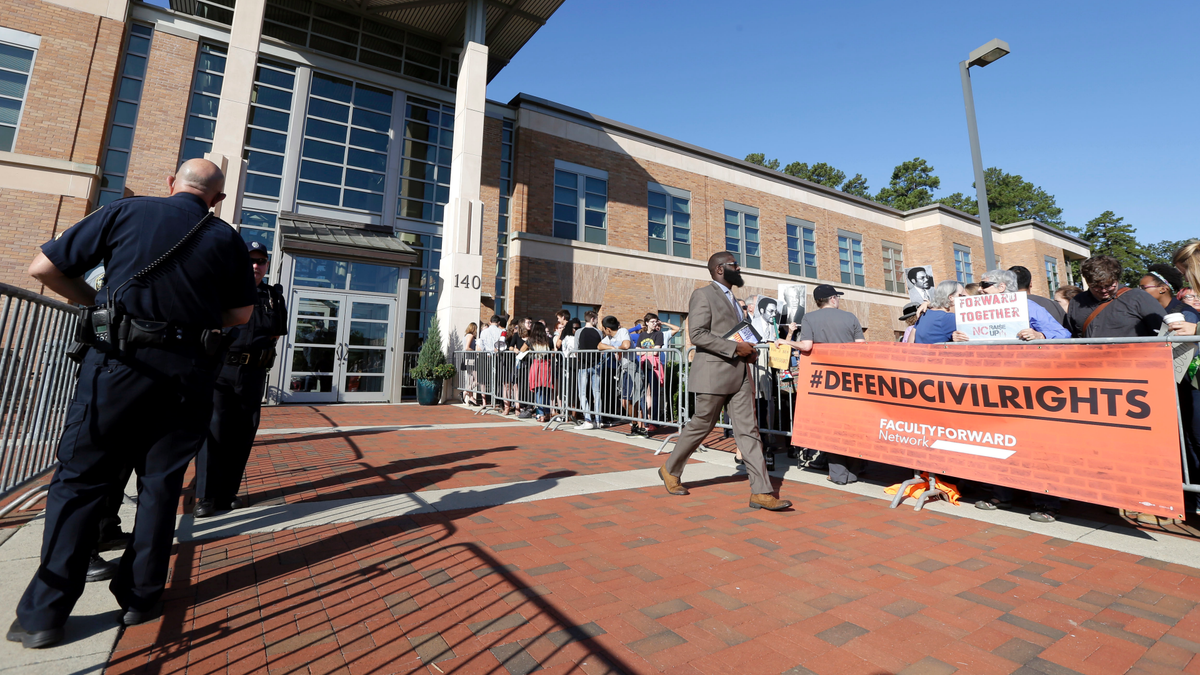
CHAPEL HILL, N.C. – The civil rights center at the University of North Carolina that helps the poor and disenfranchised can no longer litigate cases — a move that supporters say jeopardizes the center's future.
The policy-making board of the UNC system voted overwhelmingly Friday to ban litigation by the UNC Center for Civil Rights, which handles issues such as school desegregation and environmental justice.
Board members maintained that the vote didn't show a lack of support for civil rights, saying legal clinics can handle similar cases. "This is not a vote one way or the other on the UNC School of Law or the civil rights center. It's about a particular aspect of the civil rights center work," board Chairman Lou Bissette said.
Center supporters disagreed, and protesters outside chanted phrases such as "If we don't get no justice, then you don't get no peace." Their chants could be heard through parts of the meeting.
And as he left the meeting, center managing attorney Mark Dorosin yelled at the board members that they weren't being honest about their support for civil rights. When one complained that Dorosin was out of order, he yelled, "You're out of order. To say you support civil rights is out of order."
Dorosin and Ted Shaw, the center's executive director, said they didn't know what form the center would take in the future. While it could continue to exist, its attorneys wouldn't be able to continue the work they do now.
They said they would begin working immediately on where to take that work, whether to another, a new law firm or some other entity.
Supporters of the ban said they opposed the center's lawsuits against other government entities and that academic centers should concentrate on academics.
Board member Steve Long, who first proposed the ban, said the university represents poor people and minorities through law school clinics. "Our commitment to civil rights is strong, including mine," he said.
Anna Spangler Nelson, a board member who opposed the ban while chairing the committee that recommended it, said she feared the ban and the publicity surrounding it would harm UNC's reputation. "For some, this is trespassing on sacred ground," she said.
The center was founded in 2001 by famed civil rights attorney Julius Chambers, whose car, home and office were bombed as he pursued school desegregation cases in the 1960s and 1970s. While the ban applies to all academic centers on UNC campuses, it only stops the work of the civil rights center, which was the only one that handled litigation.
The vote came at a time of turmoil on the Chapel Hill campus, where the center is located. Students have pushed for the removal of a Confederate statue on campus known as Silent Sam and held a sit-in that grew out of the violent rally in August in Charlottesville, Virginia.
A law passed two years ago gives legislators final say over removing Confederate monuments from public property.
"For them to let Silent Sam reign over that spot on campus and at the same time prevent the civil rights center from doing civil rights litigation is not only a supreme irony but a supreme shame," Shaw said after the meeting.
____
Follow Martha Waggoner at http://twitter.com/mjwaggonernc

